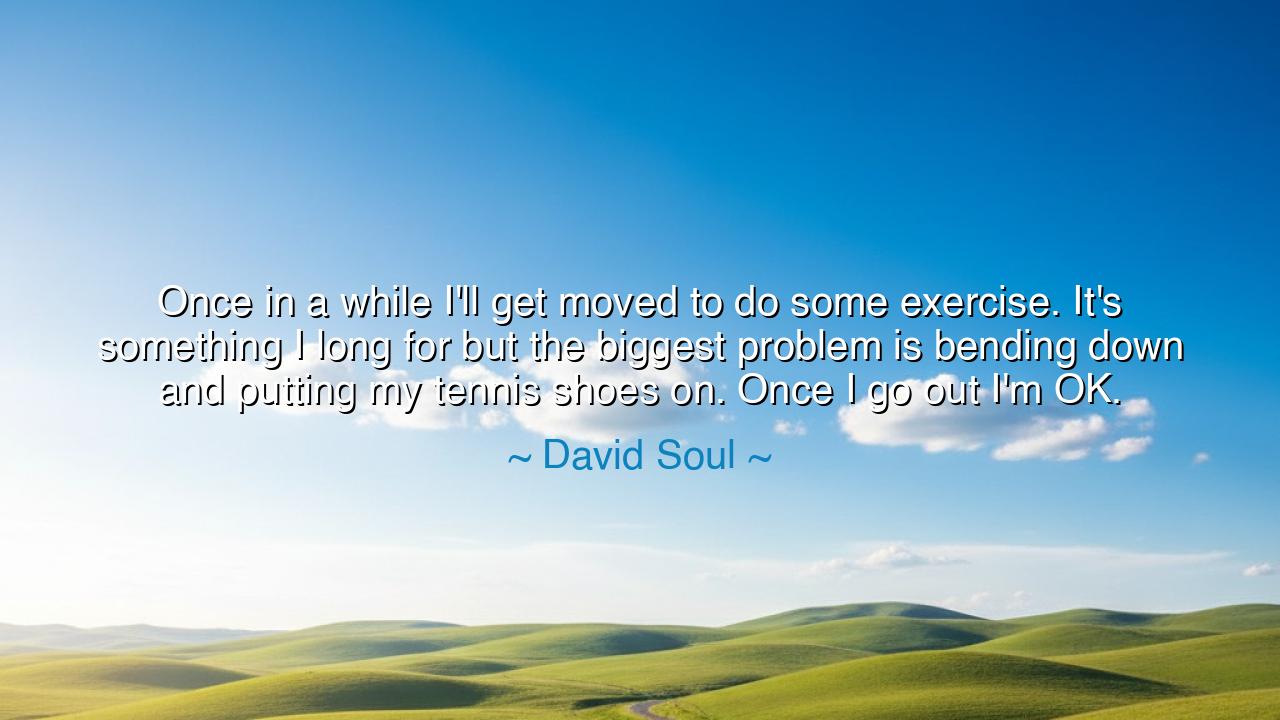
Once in a while I'll get moved to do some exercise. It's
Once in a while I'll get moved to do some exercise. It's something I long for but the biggest problem is bending down and putting my tennis shoes on. Once I go out I'm OK.






Host: The morning light slipped through the blinds like a reluctant visitor — pale, forgiving, and dust-heavy. The apartment was quiet except for the low murmur of the city beyond the window and the sputter of the old coffee pot on the counter.
In the middle of the living room, Jack sat on the couch, leaning forward, wrestling with a pair of running shoes. His hair was messy, his breath uneven, and his expression hovered somewhere between determination and regret.
Jeeny appeared from the kitchen, holding two mugs of coffee. She watched him silently for a moment — amused, maybe even a little proud — before setting one mug beside him.
On the table lay a printed quote from an old magazine clipping Jack had torn out and left there weeks ago:
“Once in a while I'll get moved to do some exercise. It's something I long for but the biggest problem is bending down and putting my tennis shoes on. Once I go out I'm OK.” — David Soul.
Jeeny: (grinning) “You look like a man at war with his laces.”
Jack: (grimacing) “It’s not the laces. It’s the principle. Once I tie these things, there’s no turning back.”
Jeeny: (sitting beside him) “You make going for a jog sound like a military campaign.”
Jack: “It might as well be. Half the battle’s getting to the door. The other half’s convincing yourself it’s worth it.”
Jeeny: (smiling) “That’s not about jogging, Jack. That’s about life.”
Host: The coffee pot hissed one final sigh, and the faint aroma of roasted beans drifted through the air — the scent of promise and procrastination intertwined.
Jack: “You ever notice that? The hardest part of doing anything — writing, running, living — is starting. Once you’re out there, you’re fine. It’s the getting up that kills you.”
Jeeny: (softly) “Because ‘getting up’ means admitting you’ve been sitting too long.”
Jack: (laughing) “Ouch. That’s profound and rude.”
Jeeny: “I try to keep my insights well-balanced.”
Host: The sunlight shifted, catching the edge of the coffee mug, sending a brief flare across the room. Jeeny leaned back, crossing one leg over the other, her face warm with that half-smile of someone who sees the humor in struggle — and the poetry too.
Jeeny: “You know, David Soul wasn’t really talking about tennis shoes. He was talking about inertia. The soul’s gravity.”
Jack: “You mean the longer you rest, the heavier the spirit gets?”
Jeeny: “Exactly. That’s why we long for movement — not just of the body, but of the heart.”
Jack: “And yet we fight it. Every time. Even when we know it’s what we need.”
Host: He finally tied the laces, a small victory disguised as routine. He sat back, exhaled, the faint sound of the city sneaking in through the window — car horns, footsteps, a street vendor shouting something in a language older than fatigue.
Jeeny: “You’re not really going to run, are you?”
Jack: “Oh, I am. Once I’ve had this coffee. And once I remember why I wanted to.”
Jeeny: “That’s the trick though — you don’t wait for the reason. You run first. The reason finds you halfway down the block.”
Host: Her voice had that grounded wisdom that only comes from small acts done consistently. The kind of truth that hides in daily habits — folding laundry, washing dishes, walking miles just to remember your own pulse.
Jack: “You make it sound almost spiritual.”
Jeeny: “Maybe it is. Every time you move your body, you remind the universe that you’re still participating.”
Jack: (chuckling) “That’s a generous way to describe sweating.”
Jeeny: “Sweating is just the body’s way of saying thank you.”
Host: He smiled, stood up, stretched. The bones in his back cracked like applause from an audience of time. For a moment, he just stood there — not heroic, not transformed — simply awake.
Jeeny: “You know, I think David Soul’s line is secretly about courage. The kind you need to face the tiny resistances that make up a day.”
Jack: “The courage to bend.”
Jeeny: (grinning) “Exactly. The courage to bend before you move.”
Host: She sipped her coffee, eyes following him as he walked toward the door, his movements stiff but determined. The light caught him just as he reached for the handle, and in that simple gesture — hand on door, breath drawn — there was something quietly cinematic.
Jack: (pausing) “You coming?”
Jeeny: “Not yet. Someone’s gotta finish the coffee. Besides, I like watching you fight gravity.”
Jack: (smirking) “You mean life.”
Jeeny: “Same thing.”
Host: He opened the door, and the morning air poured in — cool, alive, tasting faintly of rain and beginnings. He stepped outside, jogged a few uncertain steps, then found a rhythm. Not fast. Not graceful. But steady.
Jeeny watched through the window, her reflection merging with his figure as he moved down the street. She smiled — not because he was running, but because he finally had.
The camera lingered on the stillness of the room — two empty mugs, the unmade couch, the sound of a city carrying on. Then it drifted toward the open window, where sunlight and breeze intertwined.
And as the scene faded, David Soul’s humble humor unfurled into quiet philosophy:
That change rarely begins with grand gestures —
but with the small, awkward bend toward effort.
That movement starts in hesitation,
and grace begins the moment we stop stalling.
That the hardest part of living well
is not the running,
but the shoelaces —
and the decision to tie them anyway.






AAdministratorAdministrator
Welcome, honored guests. Please leave a comment, we will respond soon